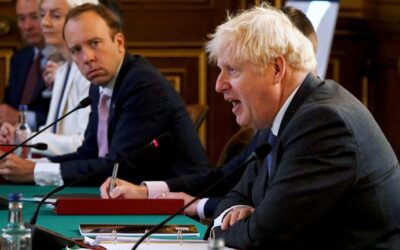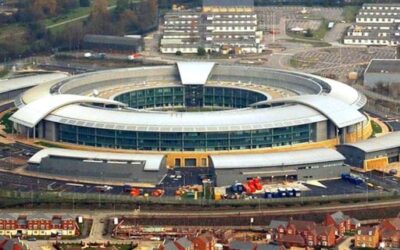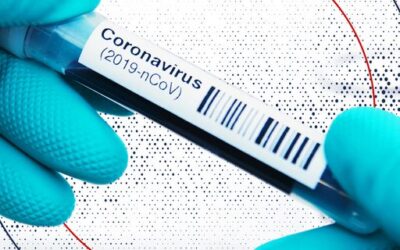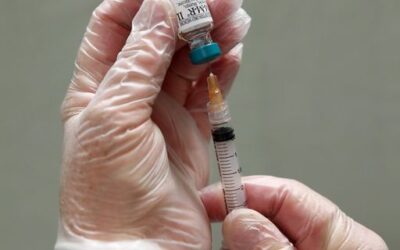The question of why UK arrivals aren’t tested for coronavirus has been asked repeatedly in recent months, by airlines, unions, MPs and passengers themselves.
Despite being standard practice in many parts of the world, the government maintains that airport testing isn’t a suitable alternative to a 14-day isolation period for travellers from risky countries because it doesn’t pick up people who get ill after they’ve arrived.
And, in support of this argument, the prime minister, transport secretary and health secretary have all insisted that testing at points of entry will only identify 7% of coronavirus infections.
Live coronavirus updates from the UK and around the world
Image: Government ministers have said testing at points of entry would only identify 7% of infections
Is that accurate? Well, it depends who you ask – and, more crucially, how you frame the question.
Advertisement
The 7% figure comes from a piece of modelling commissioned by Public Health England early in the crisis.
Like a lot of modelling, it doesn’t rely on real world data. Instead, it simplifies the problem by making a set of assumptions, then calculating what would happen in those conditions.
More from UK
Within the limits set by those assumptions, the 7% number is correct but the trouble is that the assumptions themselves are questionable – or as one senior epidemiologist put it, “weird”.
There are five assumptions, let’s take them in turn.
Assumption 1: No one flying to the UK is ill with COVID-19
Yes, you read that correctly. In this model, no one gets on a plane with full-blown coronavirus – that is, coronavirus that has developed past the incubation period.
No one with a cough or a temperature, even a very mild one, flies to the UK. Nor does anyone who is asymptomatic.
Why not? Because in the world of the model, anyone with coronavirus that can be detected by a test is presumed to be too ill to fly or is stopped from getting on the flight by screening systems in foreign countries.
As you might imagine, this has a significant impact on the paper’s conclusions.
Just over 60% of infected passengers are counted as “non-fliers” who’ll never reach the UK border.
Of the rest, most are assumed to go undetected, leaving only 7% to be picked up by UK airport testing.
Image: One model assumes no one flying to the UK has coronavirus
Reintroduce these non-fliers – either because you believe selfishness will propel sick people onto planes or because you don’t think foreign screening systems are infallible – and you get a very different result.
“Assuming that filtering is not great in the country of origin (which is an assumption that I think we should indeed make), using a single test when landing in the UK would be a very efficient policy,” one researcher told Sky News.
Reverse the model’s assumptions and airport testing could, she said, capture “more than 60% of infected individuals”. Even if you’re more conservative, you still get a big jump.
Dr Luca Ferretti, an epidemiologist at the University of Oxford advising the Italian government on its coronavirus strategy, did some calculations to work out what would happen if just half of the model’s asymptomatic passengers got on the plane.
With this change, he said, you would catch one in three infected travellers. That’s a big increase on 7% – and there are other assumptions still to unpick.
Assumption 2: Tests don’t pick up people who are pre-symptomatic
Rather than imagining a plane packed with sick people, this model pictures one full of people who are in the incubation phase after catching COVID-19.
It assumed most of these infections won’t be picked up by tests when landing in the UK as the viral load would be too low for detection.
The only people the model thinks will be caught by airport testing are those who come out of the five-day incubation period during the flight, and therefore become detectable while they are in the air.
Image: This assumption can be challenged by evidence that shows tests can pick up the virus in the incubation phase
They make up the 7%, which is based on medium-haul flights. For long-haul it comes in at 12% and for short-haul 3%, although for some reason politicians didn’t use these figures – perhaps 7% just felt right.
Once again, this assumption can be challenged.
Six months into the pandemic, evidence suggested PCR tests pick up people still in the incubation phase.
Even assuming no one on the plane comes out of incubation on the flight, it could still identify a fair proportion – with the extra benefit of catching them at their most infectious.
Dr Ferretti said that if incubating infections were detectable up to two days in advance, then even with 50% sensitivity, you would still pick up more than double the figure in the model.
Adding that to his earlier figure for asymptomatic passengers, and adjusting for some imperfections in testing, Dr Ferretti estimated that 40% of infectious travellers would be picked by airport testing.
“My intuition would be that unless you have a contact tracing system sucking all testing capacity, I would put some testing capacity on airports,” he said.
Assumption 3: Travellers are the same as everyone else
Coronavirus is a disease spread by a few chance events.
According to one recent study in India 70% of people with the virus gave it to no one, while 85% of infections came from just 5% of original cases.
When it comes to COVID-19 suppression, stopping superspreader events is absolutely key.
It’s not just possible, but likely, that travellers have more contacts than normal while they are away, making it more important to catch them as they come into the country. But this model doesn’t look at that.
Image: Other countries, including France, offer coronavirus tests at airports
Assumption 4: All countries are the same
Every country is assumed to have an equal prevalence of coronavirus, so there’s no way of knowing if testing would be more effective for some countries – because of the quality of their screening system, for instance.
The government has its travel corridors list, but even if visitors from some countries are asked to quarantine when they arrive in the UK, airport testing could still be useful, because it could help shorten the quarantine time.
The paper suggests that if passengers were tested once at the airport then once again eight days later, with a subsequent two days of isolation, the system would catch 96% of cases.
Such a system wouldn’t be easy to operate, but it might be possible in certain cases.
Assumption 5: Models can tell us what’s going to happen
Throughout the pandemic, the government has relied on models as a guide for decision-making.
But models are only as good as their assumptions, which, invariably, are far too simple to reflect the complexity of the real world.
That doesn’t mean we shouldn’t use models, but it does mean we should treat them with caution.
There is now a body of evidence based on the experiences of different countries with airport testing. Why doesn’t the government use that instead? (It established a task force last week to create a new testing regime for international travel, so this may be happening as we speak.)
Talking about the use of models, Dr Ferretti said: “This has been a bit of a constant and not just in the UK.
“There’s a habit, especially for politicians, to cherry-pick numbers because they need to justify decisions.
“Sometimes even if the decision could make sense or could be informed by some information they give a number just as a statistic to silence opposition.”
:: Subscribe to the Daily podcast on Apple Podcasts, Google Podcasts, Spotify, Spreaker
A Department of Health and Social Care spokesperson said: “This scientific evidence was reviewed and approved by SAGE, as well as modelling groups such as The London School of Hygiene & Tropical Medicine, who have independently generated similar results.
“International arrivals from non-exempt countries must quarantine for the full 14 days as the incubation period for the virus means passengers who do not follow this advice may pose a risk to others.
“Work is ongoing with clinicians, the devolved administrations and the travel industry to consider if and how testing could be used to reduce the self-isolation period.”










